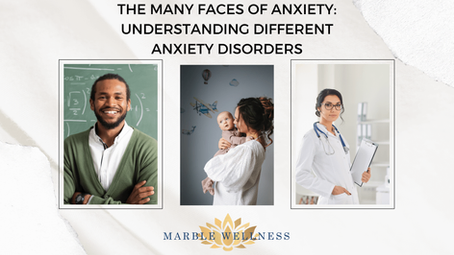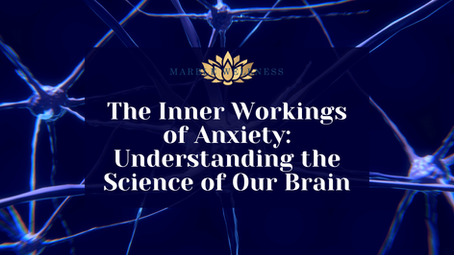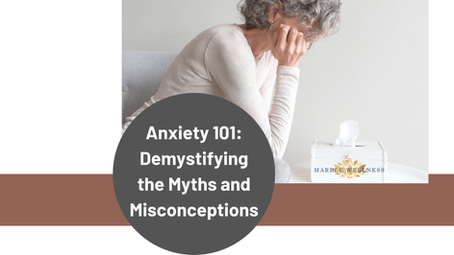Understanding the Many Faces of Anxiety
Anxiety is a complex and multifaceted emotion that can manifest in various forms. While anxiety is a common experience, it is crucial to recognize that it can take different shapes and affect individuals differently. In this blog post, we will explore the different types of anxiety disorders, shedding light on their unique characteristics, symptoms, and treatment options such as Anxiety Therapy and reconnecting with nature at parks and gardens to calm the symptoms of anxiety. By understanding the many faces of anxiety, we can foster empathy, promote effective communication, and provide the necessary support for individuals struggling with these conditions.

Generalized Anxiety Disorder (GAD):
Generalized Anxiety Disorder is characterized by excessive and persistent worry and fears about everyday situations. People with GAD often experience an overarching sense of dread, anticipating disaster and having difficulty controlling their worries. The constant worrying can be overwhelming and affect daily functioning. In addition to psychological symptoms, individuals with GAD may also experience physical symptoms such as muscle tension, restlessness, fatigue, and difficulty concentrating. Treatment options for GAD typically include anxiety therapy, such as cognitive-behavioral therapy (CBT), which helps individuals identify and challenge negative thought patterns and develop effective coping strategies. In some cases, medication may be prescribed to manage symptoms and support the therapeutic process.
Panic Disorder:
Panic Disorder is characterized by recurring and unexpected panic attacks. These episodes are intense, overwhelming, and often accompanied by physical symptoms such as heart palpitations, chest pain, shortness of breath, and a sense of impending doom. Individuals with panic disorder may develop a fear of having future panic attacks, leading to avoidance behaviors. Panic attacks can occur without a specific trigger or may be triggered by certain situations or stimuli.
Treatment for panic disorder may involve therapy, such as CBT, which helps individuals identify and challenge their fears and learn techniques to manage and reduce the frequency of panic attacks. Medication, such as selective serotonin reuptake inhibitors (SSRIs) or benzodiazepines, may also be prescribed to manage symptoms and prevent future panic attacks.
Social Anxiety Disorder (SAD):
Social Anxiety Disorder, also known as social phobia, is characterized by an intense fear of social situations. Individuals with SAD may feel extremely self-conscious, fearing judgment, criticism, and humiliation by others. They may avoid social gatherings, public speaking, or situations that require interaction with others. This fear and avoidance can significantly impact daily life and relationships.
Anxiety Therapy, including exposure therapy and cognitive restructuring, can be effective in treating social anxiety disorder. Exposure therapy involves gradually and safely exposing individuals to feared social situations, helping them develop coping strategies and reduce anxiety responses. Cognitive restructuring focuses on challenging and changing negative thoughts and beliefs about oneself in social situations. Medication, such as selective serotonin reuptake inhibitors (SSRIs) or benzodiazepines, may be prescribed to manage symptoms when necessary.
Specific Phobias:
Specific phobias are excessive and irrational fears of specific objects, situations, or experiences. Common phobias include fear of heights (acrophobia), animals (zoophobia), flying (aviophobia), or needles (trypanophobia). When exposed to their phobic trigger, individuals may experience extreme anxiety and go to great lengths to avoid encountering it.
Treatment for specific phobias often involves exposure therapy, a form of cognitive-behavioral therapy. This therapy gradually exposes individuals to their fears in a controlled and safe manner, helping them develop new associations and reduce anxiety responses. Through repeated exposure and practicing coping techniques, individuals can learn to manage their phobias and decrease avoidance behaviors.
Obsessive-Compulsive Disorder (OCD):
Obsessive-Compulsive Disorder is characterized by intrusive thoughts, images, or urges (obsessions) and repetitive behaviors or mental acts (compulsions). People with OCD may experience distressing and unwanted thoughts that cause anxiety, and they engage in rituals or repetitive behaviors as an attempt to alleviate their anxiety caused by obsessive thoughts. Common obsessions include fear of contamination, a need for symmetry, or intrusive violent or taboo thoughts. Compulsions can include excessive handwashing, checking behaviors, counting, or arranging objects in a specific order. OCD can significantly impact daily functioning and quality of life.
Treatment for OCD typically involves a combination of therapy, such as Exposure and Response Prevention (ERP), and medication to manage symptoms. ERP involves gradually exposing individuals to their obsessions and preventing the associated compulsive behaviors, allowing them to learn healthier ways of managing anxiety and reducing the impact of obsessions.
Post-Traumatic Stress Disorder (PTSD):
Post-Traumatic Stress Disorder can develop after experiencing or witnessing a traumatic event. Individuals with PTSD may re-experience the traumatic event through intrusive thoughts, nightmares, or flashbacks. They may also experience avoidance symptoms, avoid triggers associated with the trauma, and may have difficulties recalling or discussing the traumatic event. Additionally, individuals with PTSD may experience hyperarousal symptoms, such as hypervigilance, exaggerated startle response, and difficulty sleeping. PTSD can significantly impact an individual’s daily life and well-being.
Treatment options for PTSD include therapy, such as trauma-focused therapy (e.g., Cognitive Processing Therapy or Eye Movement Desensitization and Reprocessing), which helps individuals process and make sense of the traumatic event and develop healthier coping mechanisms. Medication, such as selective serotonin reuptake inhibitors (SSRIs), may be prescribed to address symptoms such as depression or anxiety.
Separation Anxiety Disorder:
Separation Anxiety Disorder is primarily diagnosed in children, but it can also affect adults. It is characterized by excessive distress and anxiety when separated from attachment figures or familiar environments. Individuals with separation anxiety disorder may have difficulty going to school or work, being alone, or sleeping away from home. They may experience intense worry about harm or danger befalling their loved ones or themselves.
Therapy, particularly cognitive-behavioral interventions, can be helpful in managing separation anxiety disorder in both children and adults. Treatment may involve gradually exposing individuals to separation situations and teaching them healthy coping skills to reduce anxiety and distress. In some cases, medication may be prescribed to manage symptoms and support the therapeutic process.
Regain Control of Your Life with Anxiety Therapy in St. Louis, MO Today!
Anxiety disorders encompass a range of conditions that can significantly impact individuals’ lives. Each disorder presents unique symptoms and challenges. Early intervention, support, and understanding play a crucial role in helping individuals with anxiety disorders regain control of their lives and improve their overall well-being. At Marble Wellness in St. Louis, MO, we are committed to providing empowering, supportive, collaborative, and action-oriented care to individuals facing anxiety disorders, helping them navigate their journey towards better mental health and a more fulfilling life.
Our Client & Project Coordinator will be your first point of contact. She’ll get you set up with a good match for you on our team, and talk first appointment details.
Meet with one of our Anxiety Therapists:
All of the members of our team are trained in and skilled at treating anxiety. They will work with you to personalize a plan to cope with and reduce your anxiety.
Start to overcome your anxiety:
Whether it’s in-person, online, or park therapy, you and your therapist will use their skills and strengths to help you start to live a life free from anxiety.
Other Mental Health Services at Marble Wellness
At Marble Wellness, our goal is simple: Counseling services are designed to help set you on a path of living a more fulfilled, calm, and happy life. We specialize in anxiety, depression, grief, chronic illness, therapy for men, couples, and maternal overwhelm. We can also help new moms with various postpartum concerns, moms in the thick of parenting, and moms with teens. In addition to in-person options, we can also chat from wherever you are in the state with online therapy in Missouri and online therapy in Illinois. No matter where you are in your journey, we would love to support you.




